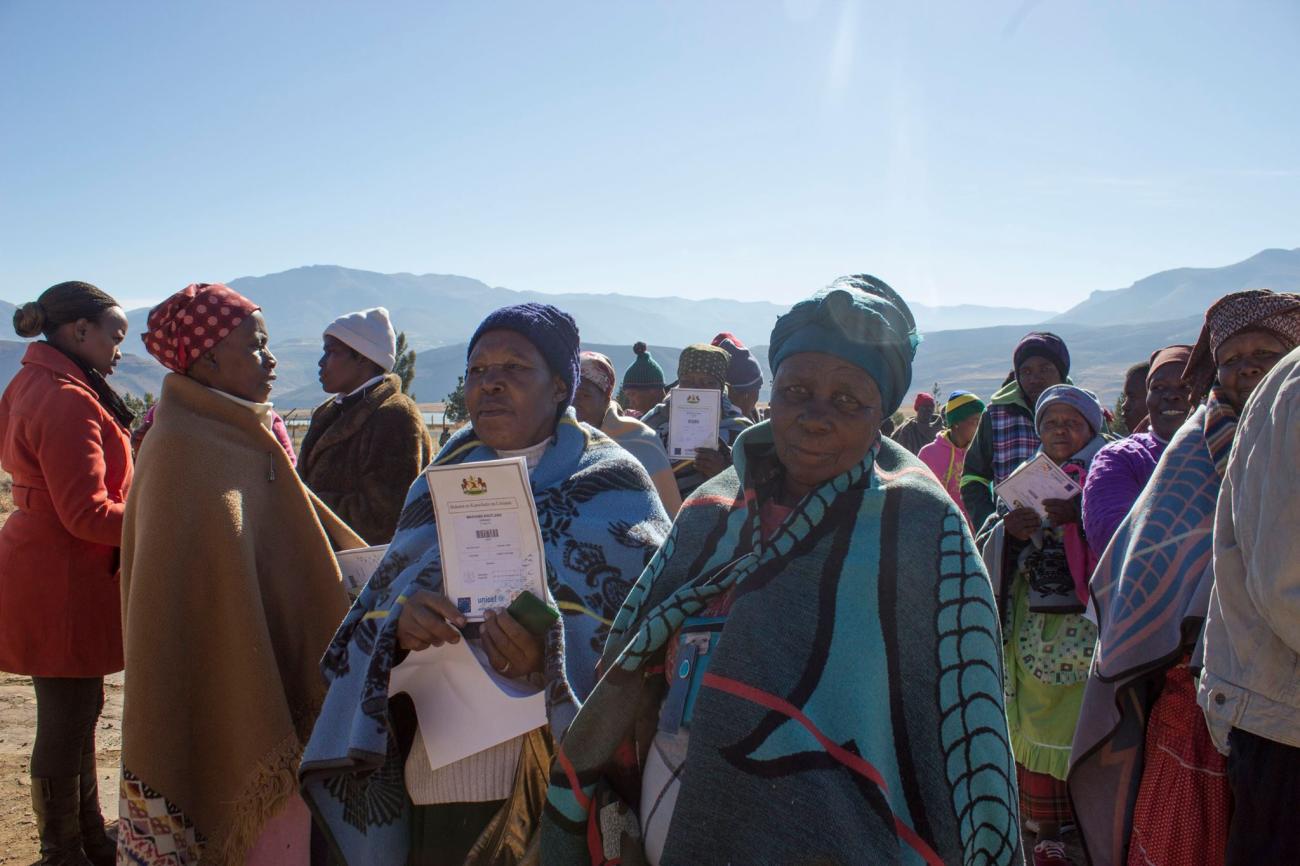Quarterly Cash Transfer to Improve Lives of Children

The 17 Sustainable Development Goals (SDG) of the 2030 Agenda for Sustainable Development adopted by world leaders in September 2015 officially came into force.
Over the next fifteen years countries have pledged to mobilize efforts geared towards ending all forms of poverty, fight inequalities and tackle climate change, while ensuring that no one is left behind.
By taking part in this historic event, Lesotho was paving the way for her citizens to participate in global developments of the 21st century. In so doing the country was also making a declaration to invest in pro-poor strategies that address social needs such as education, health and social protection.
For 65 five year old Makhomo* who stays with her two grandsons putting food on the table is a daily struggle. She is too old and sickly to do any meaningful work, a situation which is worsened by deep poverty. Makhomo falls in the estimated 57 percent Lesotho households that live the below the poverty line of less than US1.08[i] - this is according to the 2014-2019 National Social Protection Strategy.
After losing her daughter to what she calls “the disease”, Makhomo makes ends meet by doing odd jobs for her neighbours who pay her with anything from maize flour to seedlings and very rarely with money.
“When my daughter passed away I had to take care of her two children. I am too sick and tool old to be employed. When my health is good I do odd jobs for my neighbours. With the money I buy food and clothes for the children. There is never enough.” She says.
Her four acre plot of land is dry and covered with weeds. Only a small portion remains where she has planted some vegetables. She talks about how difficult it has become to put food on the table. With rising food prices many poor families are struggling to put food on the table.
One such family is that of widowed Thabiso Mokhele who stays with his two children in a one roomed mud house. He is unemployed and survives by doing menial “piece jobs” in the village. The 2015 Lesotho MDG Summary Report[ii] highlights that, for the past two decades, unemployment rate in the country is reported at a steady 25 percent[iii].
Thabiso has a small key-hold garden where has planted some vegetables. He rears a few chickens and sometimes sells the eggs to neighbours.
“My hens lay about 4 eggs a day, which I sell for M1.40. We also eat any left overs with my two children” he says.
A second year of inadequate rain as a result of the El Nino phenomena has resulted in crop failure with food insecurity affecting the poorest populations more. According to the Lesotho Vulnerability Assessment Committee (2016), over 600, 000 people in the country are in need of humanitarian assistance as a result of the El Nino phenomena. Makhomo and Thabiso fall in this category.
A quarterly cash transfer improves lives
Despite their dire situations both families continue to keep their children in school and to provide food for them. This is because Thabiso and Makhomo’s households are beneficiaries of the Lesotho Child Grants Programme (CPG) implemented through a tripartite partnership between the Ministry of Social Development, European Union and the United Nations Children’s Fund.
The CGP is a non-conditional programme which delivers a predictable cash transfer to the poorest families across Lesotho providing education and health benefits to over 20, 000 poor households taking care of approximately 69,000 children. CGP is considered the most targeted programme addressing poverty and vulnerability and to mitigate the impact of HIV on children and families.
During the current El Nino induced humanitarian crisis the programme is reaching out a further 6000 households to help them absorbs the shocks of the drought. Families such as that of Makhomo and Thabiso’s are amongst those that are receiving CGP plus emergency cash-tops to ensure that their children continue to receive nutritious meals and attend school. A move that is meant to end to ensure that children from poor households meet their daily basic needs and develop to their full potential.
*Not her real name
[i] Government of the Kingdom of Lesotho: National Social Protection Strategy 2014/2015 – 2018/2019, p.6
[ii] MDG Summary Report, 2015 Kingdom of Lesotho, p.9
[iii] Situation Analysis on Children, UNICEF- Lesotho, 2015, p.59


